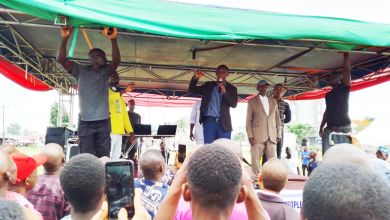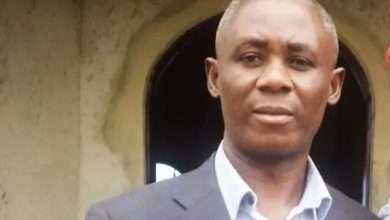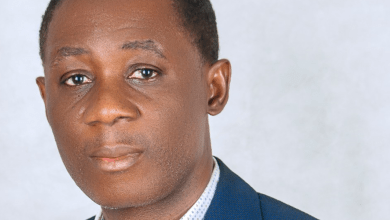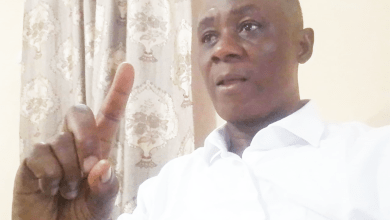Columnists
Revisiting The Ogoni Demands by Fegalo Nsuke
The question of “what the Ogonis want” have been the subject of dialectical debates. I have severally been confronted with this question even in very recent discourse. Within the context of the Nigerian oppressive hegemony, the answers to this question is incontrovertible and lies within a contextual definition of the Ogoni struggles for self determination.
There had been several positions, each holding its merits and in most cases influenced by penuiary inducements of the Nigerian oil industry.
There had been several positions, each holding its merits and in most cases influenced by penuiary inducements of the Nigerian oil industry.
One group posits that the solution exists within the framework of massive infrastructural development of Ogoni. Those who subscribe to this hold that there needs to be the construction of bridges and planting of flowers along the roads through government awarded contracts which is only possible if an Ogoni becomes the governor of our state. Obviously, this group seeks to exploit the deprivations of the Ogoni people to advance personal political ambitions without any true commitment for our environmental, political and economic security. Their argument lies in citing what Governor XYZ has done in the land or city of ABC. The presumption is that a governor of Ogoni extraction is an Ogoni governor who is coming to prosecute an ethnic agenda and will deploy state resources primarily for the Ogoni development for 4years and not necessarily advancing the interests of the entire state.
The protagonists of this idea do not see the merit in a free and democratic process that chooses candidates based on capacity to win elections and advance the interest of society to give parties a leverage in subsequent elections but rather would want to achieve their political ambitions on parochial ethnic sentiments that has grounded the entire Nigerian society. For the drivers of ethnic politics, the lessons of the civil war have not been learnt.
A second discourse centers around those who argue in favour of political autonomy and would want the Ogoni to be autonomously extricated from the exogenous influence of the Nigerian state. While this idea fits into an extreme definition of “Self Determination”, it does not represent the Ogoni intentions and representations as conceptualized in the Ogoni Bill of Rights where we clearly state our intentions to remain a part of the Nigerian federation.
A third group argues in favour of an internalized approach. To them, the Ogoni problem can only find answers in some specific Ogoni elites – the same people the governor of Rivers State, Nyesom Wike, on January 4, 2022 castigated and described as the problem. I think it is unlikely that having access to the records of governance and what transpired since 1990 between the government, Shell and the Ogoni people , his excellency could have spoken out of ignorance.
Those who favor this approach constantly attach themselves to allies of Shell with the hope that access to the oppressors can create forcible outcomes that trickles down from these government appointed chiefs and so-called leaders. They are very unrealistic. It is 29years since Shell packed out of Ogoni. The efforts of these “Chiefs and so-called leaders” have only resulted in greater conflicts. One should infer from experiences that allies of Shell cannot decide the future of the Ogoni oil. Recognizing the role of the Movement for the Survival of the Ogoni People (MOSOP) in organizing the protests that led to Shell’s exit from Ogoni, MOSOP cannot be underestimated in any effort to resolve the conflicts except there is a decision to kill far more Ogonis than previously done.
And then the fourth group which speaks the language of social transformation through a collective advancement of the common good. The thinking and behaviour of this category find roots in the exemplary leadership of the Hon. Timothy Naakuu Paul Birabi whose ideals became popularized by the late Ken Saro-Wiwa – the most celebrated Ogoni personality of our time. This category believes that it is time to address the Ogoni problem once and for all and I belong to this group.
But what would addressing the Ogoni problem “once and for all” mean?
The Path to Resolving the Ogoni Problem
The answers lie in a practical reality considering the various interests and sacrifices on the part of the government, the Nigerian oil industry and the Ogoni people as critical stakeholders.
As a people, we have basically protested against underdevelopment, political strangulation and economic denials. Our position is that we have contributed over US$200 Billion to the Nigerian economy and much of these funds have been used to build Lagos, Abuja, Enugu and several other cities in Nigeria while the Ogoni remain neglected without water, electricity, schools and hospitals amongst other needed infrastructure. We rejected and continue to reject a situation where the revenue from Ogoni is shared amongst Nigerian states and nothing comes to Ogoni because of a structural deficiency that excludes the Ogoni from participating in the revenue sharing arrangement in Nigeria.
This skewed Nigerian structure did not only deny us basic infrastructure, it also denied us every capacity to build an Ogoni economy and shape the future for our children and our children’s children.
In response, the Ogoni people in 1990 released a document entitled the “Ogoni Bill of Rights” which chronicled the awful experiences of the Ogoni people, justified our protests and made specific demands that should remedy the situation. The response of the Nigerian authorities was a brutish connivance with the Shell Petroleum Development Company, a subsidiary of Royal Dutch Shell PLC which began the persecution and repression of the Ogoni people leading to the killing of over 4,000 people by the Nigerian security forces between 1990 and 1999.
MOSOP, at various times proposed remedies to foster an understanding and build a relationship between the Ogoni people, the government and the oil industry with hope of a gradual progression towards some common grounds.
On September 27, 2020, the Central Committee of MOSOP overwhelmingly approved a proposal detailing a clear path to a resolution of the Ogoni conflicts through the operations of an Ogoni Development Authority (ODA).
The goal of the ODA is to provide a succinct answer to the question of what the Ogoni people want. In a nutshell, the ODA provides a clear path to resolve the Ogoni problem in a way that is fair to all parties and will not result in the death of anyone.
It seeks to build an economy for the Ogoni people, encouraging environmentally friendly exploration that secures a fair proportion of Ogoni resources to be set aside for Ogoni development.
The ODA is designed to build and secure a future for the Ogoni youth, achieving the dreams of Ken Saro-Wiwa and Hon. T.N. Paul Birabi for a safe, free and progressive Ogoni, investing in developing an Ogoni economy today and progressively transitioning from fossil fuels to renewable energy.
You want to read about the Ogoni Development Authority? Get an unedited copy here.
The choice is for the government to dialogue or choose to kill again. The present nocturnal arrangements where Abuja sits and decides to share the proceeds from Ogoni oil and gas resources without considering the interests of the people is no longer tenable. MOSOP expects the Nigerian government to terminate its current structure of prepotent and oppressive oligarchy. In this respect, the present alliance between the NNPC, NPDC and Sahara Energy which had no bearing towards our concerns as a people is unacceptable and completely rejected. These parties are not known to the Ogoni people nor do we trust them. If the government is truly concerned about recovering the lost revenue which currently exceeds $178 Billion over the past 29years or so, it should accept our proposals and end the nocturnal deals it reached with Sahara and friends because the Ogoni people do not accept such an arrangement.
The NPDC is known to have incited conflicts in Ogoni. Sahara Energy as far as we know has no experience in oil exploration. Ogoni rejects the disaster which obviously would come with the NPDC and Sahara. Moreover, we have extensively researched the NPDC in the communities where they currently operate and had been amazed at their woeful performance in degrading the environment and their inability to manage community interests. In fact, we judge that the NPDC is worse than Shell whom we rejected. For an environmentally conscious Ogoni, the NPDC and Sahara are out of the question.
The solution lies in proper engagement and a full implementation of the Ogoni Development Authority. It will actualize our dreams and fulfill our desires for an Ogoni whose resources will not only be significantly committed to building an economy and a future for the people but also invest in a transition from fossil fuels and secure the future for a time when oil will be no more.
Fegalo Nsuke is President of the Movement for the Survival of the Ogoni People (MOSOP). He writes from Port Harcourt, Nigeria.




